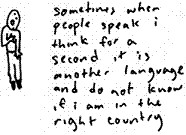| View previous topic :: View next topic |
| Author |
Message |
Hater Depot
Joined: 29 Mar 2005
|
 Posted: Sun Apr 08, 2007 10:04 pm Post subject: has vs. had Posted: Sun Apr 08, 2007 10:04 pm Post subject: has vs. had |
 |
|
To help my girlfriend prepare for the TOEFL I'd like a clear grammatical explanation for why this sentence is talking about stars in general, rather then one specific star:
A star that has used up its energy and has lost its heat becomes a black dwarf.
I explained that if it were 'had' then it would indeed be talking about just one star, and then 'becomes' would be changed to 'became', but I just couldn't do well enough. Can someone please help? |
|
| Back to top |
|
 |
Bibbitybop

Joined: 22 Feb 2006
Location: Seoul
|
 Posted: Sun Apr 08, 2007 10:25 pm Post subject: Posted: Sun Apr 08, 2007 10:25 pm Post subject: |
 |
|
has = present tense
had = past tense
Too simple of an explanation? |
|
| Back to top |
|
 |
faster

Joined: 03 Sep 2006
|
 Posted: Sun Apr 08, 2007 10:56 pm Post subject: Posted: Sun Apr 08, 2007 10:56 pm Post subject: |
 |
|
EDIT: My answer was irrelevant because I didn't read the question carefully and have a giant tumor in my brain shaped like Regis Philbin.
Last edited by faster on Mon Apr 09, 2007 7:12 am; edited 1 time in total |
|
| Back to top |
|
 |
Woden
Joined: 08 Mar 2007
Location: Eurasia
|
 Posted: Sun Apr 08, 2007 11:17 pm Post subject: Posted: Sun Apr 08, 2007 11:17 pm Post subject: |
 |
|
Present tense is used to talk about 'the eternal present' - so it could be used to talk about a state or a quality that is permanent. Using it here refers to such a state, as it is referring to the conditions of all stars.
The sentence also uses the indefinite article so could not be referring to a specific star, I would say that the article is more important in respect of your question. The question of tense is more concerned with just that, time. If it were to read 'had' it could still refer to 'stars in general' but stars in the past. |
|
| Back to top |
|
 |
kiwiliz
Joined: 20 Apr 2006
Location: New Zealand
|
 Posted: Sun Apr 08, 2007 11:26 pm Post subject: Posted: Sun Apr 08, 2007 11:26 pm Post subject: |
 |
|
| Yes, I would say it is more the use of the indefinatle atricle. 'The star' is more specific than 'a star' |
|
| Back to top |
|
 |
Woland
Joined: 10 May 2006
Location: Seoul
|
 Posted: Mon Apr 09, 2007 1:40 am Post subject: Posted: Mon Apr 09, 2007 1:40 am Post subject: |
 |
|
| Woden wrote: |
Present tense is used to talk about 'the eternal present' - so it could be used to talk about a state or a quality that is permanent. Using it here refers to such a state, as it is referring to the conditions of all stars.
The sentence also uses the indefinite article so could not be referring to a specific star, I would say that the article is more important in respect of your question. The question of tense is more concerned with just that, time. If it were to read 'had' it could still refer to 'stars in general' but stars in the past. |
Yeah, ENglish uses the present simple to refer to things which are generically the case. There's a technical name for this, but I've forgotten it.
You can't really go by article use, though there is a correlation with use of the indefinite in these constructions. Article use is more determined by discourse and it is possible to imagine sentences that are generic and still use the definite article in particular discourses, especially narrations of different kinds. |
|
| Back to top |
|
 |
Privateer
Joined: 31 Aug 2005
Location: Easy Street.
|
 Posted: Mon Apr 09, 2007 1:43 am Post subject: Posted: Mon Apr 09, 2007 1:43 am Post subject: |
 |
|
| Bibbitybop wrote: |
has = present tense
had = past tense
Too simple of an explanation? |
has used up = present perfect tense
had used up = past perfect tense
However, it's 'A star (that has used up its energy and has lost its heat) becomes a black dwarf' so the main verb of the sentence is simple present tense. Since simple present is used to talk about things that are always or generally true, it's not talking about any particular star*.
If you change the main verb 'becomes' to simple past 'became', then it has to be a particular star by virtue of the fact that the simple past is always about specific events in the past; and the defining relative clause attached to the subject changes from 'has used up' to 'had used up' simply to match the change in the main verb.
So, essentially:-
simple present 'becomes' = stars in general.
simple past 'became' = a particular star.
(*However, we sometimes use the simple present to tell stories ('A man walks into a bar...') instead of using the simple past, so it's not impossible for it to be referring to a particular star: you have to look at the context) |
|
| Back to top |
|
 |
plokiju

Joined: 15 Mar 2005
|
 Posted: Mon Apr 09, 2007 5:22 am Post subject: Posted: Mon Apr 09, 2007 5:22 am Post subject: |
 |
|
I'd say the indefinite article helps reinforce the generality of the statement. You could easily change "a star" to "any star" and it has the same meaning. As opposed to "a dog bit me" where it was some random dog rather than a specific one.
The present tense of "to become", though, should be enough to say that it is a general statement about stars. If this isn't enough to satisfy your girlfriend then she's looking for some easy explantion that probably isn't there.
It could be because from the context we know that this is true about every star that has lost its heat (or will lose its heat for that matter) and intuitively know it's a general statement. I think for the "a man walks into a bar" tense we'd need additional sentences to confirm it. This statement though is so simple and plain that we can tell it isn't a story. If someone just said something like "A man hikes the mountain" we would ask when or something else because to our ears it just doesn't sound complete.
I think that tense may actually be gramatically incorrect but allowable for storytelling. I know that technically "To boldly go" is gramatically incorrect but sounds better or more dramatic than "to go boldly.. where no man has gone before." Poetic license that may drive strict grammaticians bonkers. |
|
| Back to top |
|
 |
Pak Yu Man

Joined: 02 Jun 2005
Location: The Ida galaxy
|
 Posted: Mon Apr 09, 2007 6:59 am Post subject: Posted: Mon Apr 09, 2007 6:59 am Post subject: |
 |
|
That's a TOFEL question? lol.
A black dwarf is a theoretical star. I don't think astronomers have found one yet. |
|
| Back to top |
|
 |
Hater Depot
Joined: 29 Mar 2005
|
 Posted: Mon Apr 09, 2007 6:43 pm Post subject: Posted: Mon Apr 09, 2007 6:43 pm Post subject: |
 |
|
Thanks everybody, that was great.
| Quote: |
| Poetic license that may drive strict grammaticians bonkers. |
Split infinitives were not considered poor grammar until the 18th century... |
|
| Back to top |
|
 |
|

